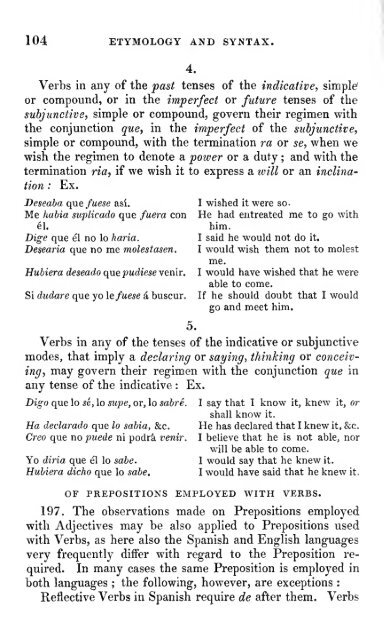A concise and simplified grammar of the Spanish language
A concise and simplified grammar of the Spanish language
A concise and simplified grammar of the Spanish language
You also want an ePaper? Increase the reach of your titles
YUMPU automatically turns print PDFs into web optimized ePapers that Google loves.
104 ETYMOLOGY AND SYNTAX.<br />
4.<br />
Verbs in any <strong>of</strong> <strong>the</strong> past tenses <strong>of</strong> <strong>the</strong> indicative, simple<br />
or compound, or in <strong>the</strong> imperfect or future tenses <strong>of</strong> <strong>the</strong><br />
subjunctive, simple or compound, govern <strong>the</strong>ir regimen with<br />
<strong>the</strong> conjunction que, in <strong>the</strong> imperfect <strong>of</strong> <strong>the</strong> subjunctive,<br />
simple or compound, with <strong>the</strong> termination ra or se, when we<br />
wish <strong>the</strong> regimen to denote a power or a duty ; <strong>and</strong> with <strong>the</strong><br />
termination ria, if we wish it to express a ivill or an inclina'<br />
Hon : Ex.<br />
Deseaba que fuese así. I wished it were so-<br />
Me habia suplicado que fuera con He had entreated me to go with<br />
él. him.<br />
Dige que él no lo haria. I said he would not do it.<br />
Desearía que no me molestasen. I would wish <strong>the</strong>m not to molest<br />
me.<br />
Hubiera deseado que pudiese \eiúr. I would have wished that he were<br />
able to come.<br />
Si dudare que yo le fuese á buscur. If he should doubt that I would<br />
go <strong>and</strong> meet him.<br />
5.<br />
Verbs in any <strong>of</strong> <strong>the</strong> tenses <strong>of</strong> <strong>the</strong> indicative or subjunctive<br />
modes, that imply a declaring or saying, thinking or conceiv-<br />
ing, may govern <strong>the</strong>ir regimen with <strong>the</strong> conjunction que in<br />
any tense <strong>of</strong> <strong>the</strong> indicative : Ex.<br />
Digo que lo sé, lo supe, or, lo sabré. I say that I know it, knew it, or<br />
shall know it.<br />
Ha declarado que lo sabia, &c. He has declared that I knew it, &c.<br />
Creo que no puede ni podrá venir. I believe that he is not able, nor<br />
will be able to come.<br />
Yo diria que él lo sabe. I would say that he knew it.<br />
Hubiera dicho que lo sabe. I would have said that he knew it.<br />
OF PREPOSITIONS EMPLOYED W^ITH VERBS.<br />
197. The observations made on Prepositions employed<br />
with Adjectives may be also applied to Prepositions used<br />
with Verbs, as here also <strong>the</strong> <strong>Spanish</strong> <strong>and</strong> English <strong>language</strong>s<br />
very frequently differ with regard to <strong>the</strong> Preposition re-<br />
quired. In many cases <strong>the</strong> same Preposition is employed in<br />
both <strong>language</strong>s ; <strong>the</strong> following, however, are exceptions :<br />
Reflective Verbs in <strong>Spanish</strong> require de after <strong>the</strong>m. Verbs

















